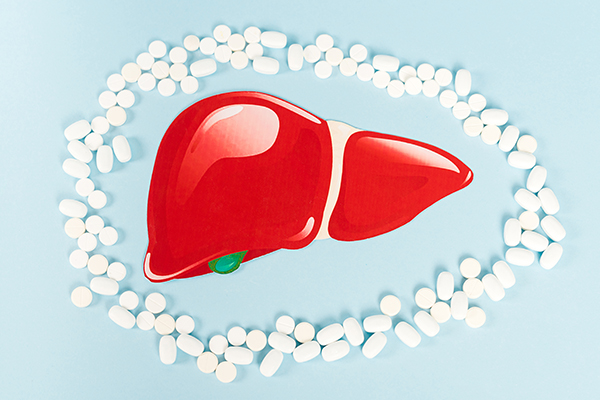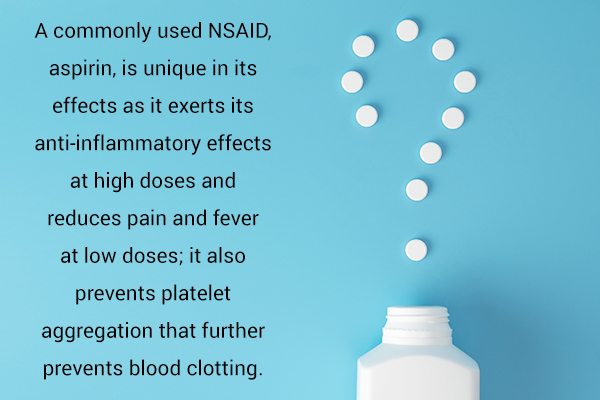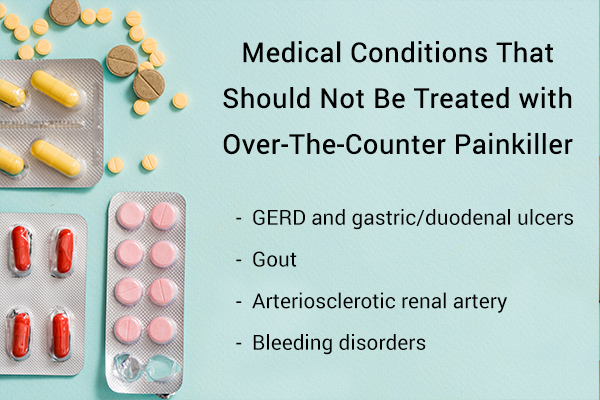In this article:
Pain can affect one’s ability to carry out day-to-day responsibilities and sleeping habits, further decreasing the quality of life. The accessibility to purchase over-the-counter (OTC) painkillers allows individuals to seek short-term management to subside discomfort that serves as a barrier to living a quality life.

Pain can be scaled on a case-by-case basis with each individual ranging from mild to severe. The onset may be unpredictable from physiologic or pathologic etiologies or preceded by certain events such as direct injuries. The duration can also be acute or chronic, making treatment modalities complex.
With many options of different OTC pain-alleviating treatments, it can be challenging to decide which is the most suitable for the type of pain an individual may be suffering from and what dosage is considered safe. The benefit of OTC pain management should be weighed with its adverse effects. (1)
What Are OTC Painkillers?
In 1951, the Durham-Humphrey Amendment made adjustments to the 1938 Federal Food, Drug, and Cosmetic Act by creating a legal distinction between which drugs must be prescribed by a licensed practitioner and which drugs can be sold over the counter by a pharmacist. (2)
There are many different types of analgesics or painkillers to aid in the reduction of pain. Indications for pain medication vary depending on the pain severity and if administered by a licensed practitioner.
A licensed practitioner is not required if a drug meets US Food and Drug Administration guidelines. Individuals can purchase OTC painkillers at a general store without a prescription. The most widely used painkillers are acetaminophen, nonsteroidal anti-inflammatory drugs (NSAIDs), and opioids, but only acetaminophen and some NSAIDs can be bought without a prescription.
Acetaminophen is sold under different names in different countries, with paracetamol, Tylenol, Aceta, and Panadol being some of the most popular ones. Meanwhile, some of the best-known OTC NSAIDs are aspirin, ibuprofen, and naproxen.
Aspirin also has different trade names such as Anacin, Ascriptin, Bayer, Bufferin, Ecotrin, and Excedrin. Ibuprofen trade names are Advil, Motrin, Motrin IB, and Nuprin. Naproxen trade names are Naprosyn, Naprelan, Aleve, and Anaprox.
What Are the Dangers of Taking OTC Painkillers?

Be careful when taking nonprescription pain medications as they can have unpleasant side effects.
1. Interferes with antidepressants
Antidepressants increase the availability and activity of certain neurotransmitters such as serotonin, dopamine, and norepinephrine, which have a positive impact on your mood.
While acetaminophen, NSAIDs, and aspirin do not control the availability of serotonin, dopamine, or norepinephrine, (3) other OTC medications can adversely influence the availability of these neurotransmitters. These mainly include the cough suppressant dextromethorphan and the nasal decongestant pseudoephedrine.
Some OTC medications have a mixture of dextromethorphan and acetaminophen, which also interact negatively with antidepressants. (4)
2. Liver dysfunction
The liver plays a significant role in the human body when ingesting medications orally. It is responsible for filtering out and metabolizing venous blood from the digestive tract.
When acetaminophen is ingested in high amounts, its by-product of metabolism can accumulate. The poisonous metabolite is toxic and damaging to the liver and could cause acute liver injury and possibly acute liver failure in some individuals. (5)
What Other Side Effects Do OTC Painkillers Have?
Taking OTC painkillers can also lead to the following side effects.
1. Acute interstitial nephritis
Allergic reactions occur from many different triggers, including medication.
Allergic reactions induced by OTC NSAIDs cause inflammation within the kidney called acute interstitial nephritis (AIN). Chronic intake of NSAIDs is responsible for AIN, which may present with no symptoms. However, if not managed correctly, it could lead to end-stage renal disease. (6)
2. Reye syndrome
Ingestion of OTC aspirin to relieve the symptoms of a viral infection can lead to Reye syndrome in children. It manifests in stages progressing from vomiting, confusion, and liver enlargement to deep coma and seizures.
Aspirin avoidance during an acute viral infection in young adolescents and children is crucial to avoid the possibility of death. (7)
3. Renal papillary necrosis
NSAIDs decrease the secretion of mediators that dilate the blood vessel supplying a section within the kidney known as the medulla. (8) When this occurs, the area lacks nutrients to survive and dies, known as necrosis.
Symptoms may not arise immediately, making it challenging to know if adverse effects of taking NSAIDs are happening. Symptoms arise late, presenting as back pain, urinating pain, and blood in the urine.
Not being treated could lead to chronic renal disease or death. (8)(9)
4. Acute liver injury

Some individuals are susceptible to acute liver injury when taking a higher dosage of acetaminophen, although its occurrence at a therapeutic dose isn’t uncommon.
The liver is a highly functional organ requiring energy through the mitochondria. The toxic amounts of acetaminophen cause free radicals to form. These free radicals deplete glutathione, which is the body’s natural antioxidant, triggering mitochondrial damage. This can lead to injury to the liver and acute liver failure, which could require a liver transplant. (10)
5. Renal toxicity
NSAIDs can also reduce the luminal diameter (vasoconstriction) of the afferent renal arterioles of the kidney. The lack of blood flow may cause the functioning kidney to retain sodium, which can result in increases in blood pressure.
Over time, the decrease in perfusion may lead to injury to certain parts of the nephron and potentially result in acute/chronic kidney injury, renal papillary necrosis, and mortality.
When taking OTC NSAIDs, visually seeing blood in urine, having pain while urinating, flank pain, or new onset of hypertension could be indications of renal injury secondary to NSAIDs. (11)(8)(10)
6. Others
NSAIDs can also induce acute reactions, such as asthma, hives, angioedema, and anaphylaxis that can prove deadly.
Other life-threatening side effects of NSAIDs and acetaminophen are severe cutaneous adverse reactions (SCARs), which include toxic epidermal necrolysis, Stevens-Johnson syndrome (SJS), acute generalized exanthematous pustulosis, and drug reaction with eosinophilia and systemic symptoms (DRESS). (12)(13)
How Effective Are OTCs?

The effectiveness of OTC pain management may be subjective to each individual and may be very effective.
Commonly used OTC agents include acetaminophen and aspirin, and their indications for use may vary. Acetaminophen, alongside its indication to alleviate pain, also functions as an antipyretic and decreases fever.
NSAIDs decrease inflammation alongside their function to reduce pain and fever. A commonly used NSAID, aspirin, is unique in its effects as it exerts its anti-inflammatory effects at high doses and reduces pain and fever at low doses; it also prevents platelet aggregation that further prevents blood clotting. (14)
What Medical Conditions Should Not Be Treated With OTCs?
Choosing which OTC painkiller to use can be challenging if you have underlying ailments that may serve as a contraindication.

GERD and gastric/duodenal ulcers
Individuals with gastroesophageal reflux disease (GERD) and gastric/duodenal ulcers should avoid using NSAIDs, including aspirin.
The stomach has a protective mucus barrier surrounded by undigested food in an acidic fluid mixture. NSAIDs, including aspirin, reduce the mucus barrier lining the gut, leading to more acidity with a thinner defense layer surrounding the stomach. This could lead to stomach ulcers, acidic chyme that can ulcerate the duodenum, or reflux through the esophagus.
Discontinuing NSAIDs is critical in individuals with GERD and gastric/duodenal ulcers. (15)
Gout
Acute gout flare-ups can leave individuals feeling debilitated and experiencing sudden pain in the affected joints. Not knowing which OTC painkiller to use could lead to recurrent sudden arthritic type pain.
Low-dose aspirin is a cardiovascular protective OTC medication that can manage pain. It competes with uric acid in the kidney, which causes uric acid to accumulate and precipitate an acute gout flare-up. (16)
Other NSAIDs such as ibuprofen can be utilized to manage the painful flare-ups.
Arteriosclerotic renal artery
Atherosclerosis is a chronic progressive disease characterized by the accumulation of plaque on the inner walls of arteries. These plaque deposits contain fats, cholesterol, and other substances that harden over time and constrict the passage of blood within the affected blood vessels.
In individuals with renal artery atherosclerosis, the kidney adapts as atherosclerosis develops and narrows the luminal diameter. OTC NSAIDs, including aspirin, reduce the luminal diameter of the afferent artery, which could lead to acute kidney injury or death of the kidneys’ functional units (glomeruli). (11)
For individuals diagnosed with arteriosclerosis of the renal artery, NSAIDs, including aspirin, should be avoided. (17)
Bleeding disorders
Aspirin’s unique ability to prevent clots could be dangerous in individuals with preexisting platelet disorders. Platelets form a direct plug to stop blood from leaking from the vessels during trauma.
In Bernard-Soulier syndrome and Glanzmann thrombasthenia, the platelets are inept and cannot form the primary platelet plug. Individuals with these conditions taking OTC aspirin could have a higher tendency to bleed.
OTC aspirin inhibits the aggregation between platelets for the lifetime of the platelet, which is for 5–7 days. (18) Aspirin avoidance is critical in these individuals.
What Natural Ways Can Be Used to Alleviate Pain?

Depending on the underlying etiology causing the pain, conservative measures such as the RICE method (rest, ice, compress, and elevate) can be effective.
Final Word
OTC painkillers provide quick relief to common pains, aches, and discomforts to improve your overall quality of life. But for all their merits, these readily available medications can have some serious side effects as well, especially if taken too much.
Plus, one can easily become dependent on these meds, resulting in addiction. Therefore, you must educate yourself about the risks and side effects associated with these drugs and use them in the recommended manner and dosage. Always consult your healthcare provider when unsure about using OTC agents.
- Was this article helpful?
- YES, THANKS!NOT REALLY


